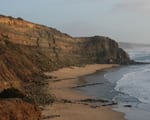Reporter Eric Nicholson of the Dallas Observer has covered the research of SMU religious studies expert Mark A. Chancey. A new report by Chancey, “Reading, Writing & Religion II,” found that most of the 60 public school districts in Texas that offer Bible study courses aren’t meeting a 2007 state law mandating that the courses be fair as well as academically and legally sound.
Chancey prepared the report for the Austin-based education watchdog group Texas Freedom Network. His study uncovered bias, factual errors and insufficient curriculum standards in Texas public school Bible courses. An SMU Religious Studies professor, Chancey recommends the Texas State Board of Education develop Bible course curriculum standards and the Texas Education Agency be allowed funds for a teacher training program.
“As a biblical scholar and especially as a parent, I want our state’s public schools to take the study of the Bible’s influence as seriously as they do the study of science or history,” Chancey told The Dallas Morning News. “Academically, many of these classes lack rigor and substance, and some seem less interested in cultivating religious literacy than in promoting religious beliefs. Their approach puts their school districts in legal jeopardy and their taxpayers in financial jeopardy.”
Chancey, a professor in SMU’s Dedman College of Humanities and Sciences, has devoted considerable attention to the constitutional, political and academic issues raised by religion courses in public schools.
EXCERPT:
Eric Nicholson
Dallas Observer
Six years ago, SMU religious studies professor Mark Chancey teamed with the Texas Freedom Network to produce a report on the Bible classes that were proliferating in the state’s public school classrooms.Chancey’s not-very-surprising finding was that these classes were not so much even-handed, academically rigorous surveys of the text in its proper historical context as they were thinly veiled sermons that were filled with factual discrepancies and tended to promote a particular flavor of Bible Belt Protestantism. He took particular issue with school districts’ use of material provided by National Council on Bible Curriculum in Public Schools, which he said was filled with “shoddy research, factual errors and plagiarism.”
State legislators actually stepped up to the plate, passing legislation in 2007 stipulating, among other things, that Bible courses must be taught by educators who have undergone special training and must follow curriculum guidelines developed by the State Board of Education. Problem solved.
Not quite, says Kathy Miller, president of the Texas Freedom Network, a SBOE watchdog. While the measure looked good on paper, the Legislature opted not to fund any sort of teacher training program, and the curriculum guidelines developed by the SBOE were vague and left districts a large amount of wiggle room.
That hasn’t stopped districts across the state from adding Bible classes to their course offerings. In response, Chancey and TFN have teamed up once again to see how academically rigorous — and constitutional — the new batch of classes are.
This time around, Chancey surveyed 60 courses from around the state. Eleven of them, including Plano ISD, were found to be “especially successful in displaying academic rigor and a constitutionally sound” approach.
“The rest of the courses still have the same sorts of problems that we documented back in ’06,” Chancey said in a conference call with reporters on Wednesday.
Follow SMUResearch.com on Twitter.
For more information, www.smuresearch.com.
SMU is a nationally ranked private university in Dallas founded 100 years ago. Today, SMU enrolls nearly 11,000 students who benefit from the academic opportunities and international reach of seven degree-granting schools. For more information see www.smu.edu.
SMU has an uplink facility located on campus for live TV, radio, or online interviews. To speak with an SMU expert or book an SMU guest in the studio, call SMU News & Communications at 214-768-7650.


 Study finds Jurassic ecosystems were similar to modern: Animals flourish among lush plants
Study finds Jurassic ecosystems were similar to modern: Animals flourish among lush plants SMU contributes fossils, expertise to new Perot Museum in ongoing scientific collaboration
SMU contributes fossils, expertise to new Perot Museum in ongoing scientific collaboration 100 million-year-old coelacanth discovered in Texas is new fish species from Cretaceous
100 million-year-old coelacanth discovered in Texas is new fish species from Cretaceous Academic achievement improved among students active in structured after-school programs
Academic achievement improved among students active in structured after-school programs New study on kingship and sainthood in Islam offers a striking new historical perspective
New study on kingship and sainthood in Islam offers a striking new historical perspective Texas frontier scientists who uncovered state’s fossil history had role in epic Bone Wars
Texas frontier scientists who uncovered state’s fossil history had role in epic Bone Wars
 Observed! SMU’s LHC physicists confirm new particle; Higgs ‘God particle’ opens new frontier of exploration
Observed! SMU’s LHC physicists confirm new particle; Higgs ‘God particle’ opens new frontier of exploration Ancient tree-ring records from southwest U.S. suggest today’s megafires are truly unusual
Ancient tree-ring records from southwest U.S. suggest today’s megafires are truly unusual Human diabetes has new research tool: Overfed fruit flies that develop insulin resistance
Human diabetes has new research tool: Overfed fruit flies that develop insulin resistance